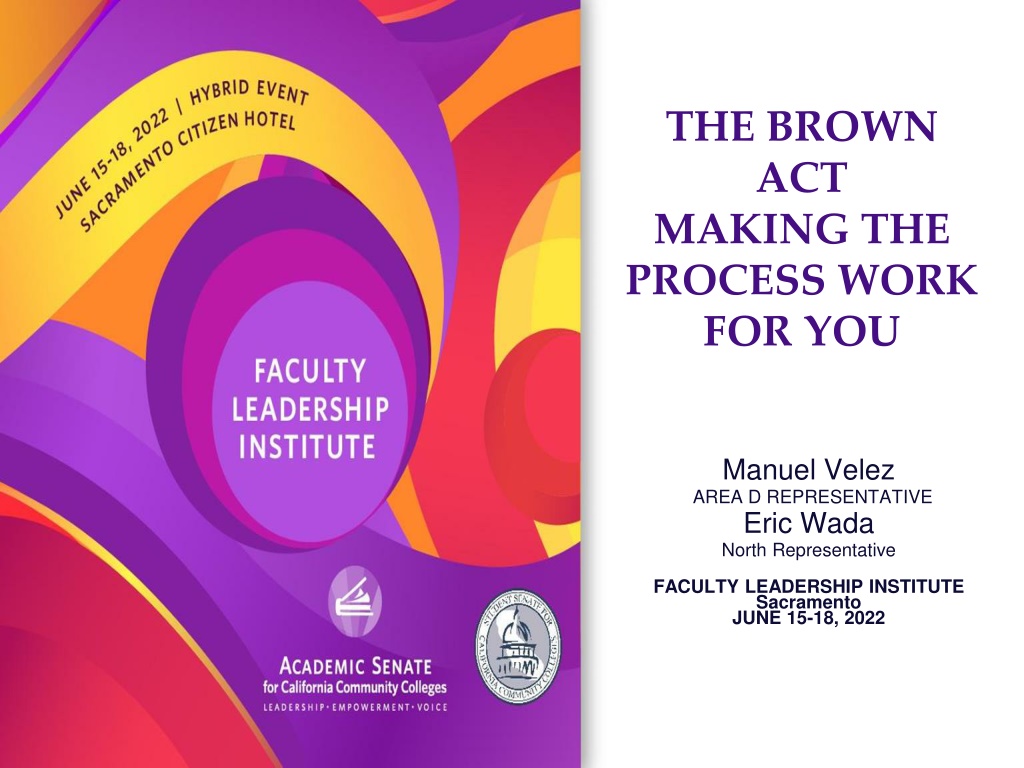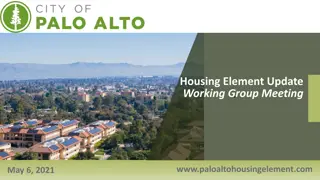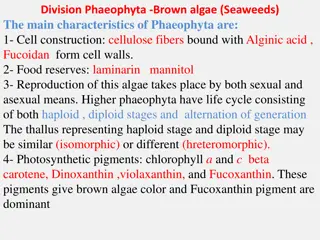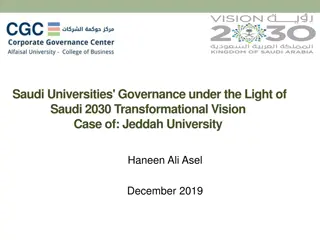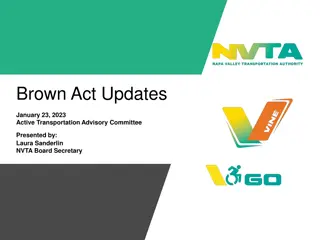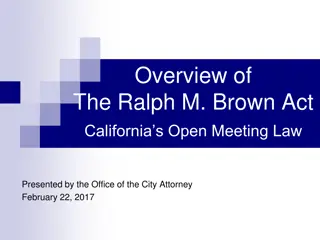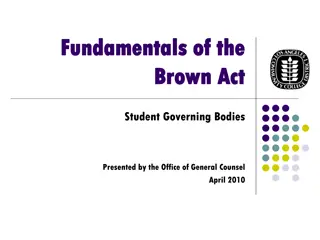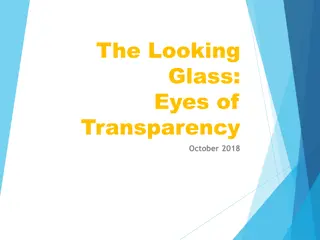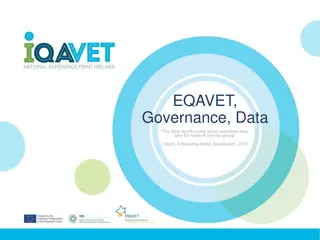Understanding the Brown Act for Transparent Governance
The Brown Act ensures open and public meetings for legislative bodies in California, empowering citizens to stay informed and retain control over public agencies. It applies to governing bodies, appointed bodies, and certain private entities, promoting transparency and accountability in decision-making processes.
Uploaded on Sep 24, 2024 | 0 Views
Download Presentation

Please find below an Image/Link to download the presentation.
The content on the website is provided AS IS for your information and personal use only. It may not be sold, licensed, or shared on other websites without obtaining consent from the author. Download presentation by click this link. If you encounter any issues during the download, it is possible that the publisher has removed the file from their server.
E N D
Presentation Transcript
THE BROWN ACT MAKING THE PROCESS WORK FOR YOU Manuel Velez AREA D REPRESENTATIVE Eric Wada North Representative FACULTY LEADERSHIP INSTITUTE Sacramento JUNE 15-18, 2022
POLICY The people of this State do not yield their sovereignty to the agencies which serve them. The people, in delegating authority, do not give their public servants the right to decide what is good for the people to know and what is not good for them to know. The people insist on remaining informed so that they may retain control over the instruments they have created. - GC Section 54950
LEGISLATIVE BODIES All meetings of the legislative body of a local agency shall be open and public, and all persons shall be permitted to attend any meeting of the legislative body of a local agency, except as otherwise provided in this chapter. -GC Section 54953(a)
Is This a Legislative Body? The Brown Act applies to all Legislative Bodies Legislative Bodies include: 1) Governing Bodies 2) Appointed Bodies 3) Certain private entities
Governing Bodies The governing body of a local agency or any other local body created by state or federal statute is subject to the Brown Act. Examples: Community College District Board of Trustees, City Council, School Board Education Code 70902: Every community college district shall be under the control of a board of trustees Bottom Line: If created by statute, the local body is covered by the Brown Act
Appointed Bodies General Rule: A commission, committee, board, or other body of a local agency, whether permanent or temporary, decision-making or advisory, created by charter, ordinance, resolution, or formal action of a legislative body. Bottom Line: Committees created by formal action of a legislative body are subject to the Brown Act. EXAMPLE: The Chancellor of the Salton Sea CCD appoints a committee to make recommendations on a new mascot for Salton Sea College. Are the meetings of the mascot committee subject to the Brown Act?
Salton Sea CCD No! An advisory body created by formal action of a legislative body is subject to the Brown Act. In this example, the mascot committee was created by the Chancellor. What if a member of the board of trustees informally establishes an advisory committee to advise her on mascot- related issues as they arise?
Salton Sea CCD No! An advisory body created by formal action of a legislative body is subject to the Brown Act. A mascot committee created informally by an individual member of the board, and not by formal action of the body, is not subject to the Brown Act.
Appointed Bodies Standing Committees Standing Committees of a legislative body are ALWAYS subject to the Brown Act. Standing committees, irrespective of composition, which have either: (1) a continuing subject matter jurisdiction, or (2) a meeting schedule fixed by resolution or formal action of the legislative body. Examples: long-term committees on professional development or curriculum.
Appointed Bodies Temporary Advisory Committee Exception Ad Hoc: Made or happening only for a particular purpose or need. A temporary advisory committee composed solely of less than a quorum of the legislative body that serves a limited or single purpose, that is not perpetual, and that will be dissolved once its specific task is completed is not subject to the Brown Act.
Salton Sea CCD The Salton Sea CCD Board of Trustees establishes a two member advisory committee to make a recommendation on a new mascot for Salton Sea College. The mascot committee s two members are both members of the Salton Sea CCD Board of Trustees. Are the meetings of this mascot committee subject to the Brown Act? NO!
Private Entities Certain private entities are subject to the Brown Act The governing body of any private organization that is either: (1) created by the legislative body in order to exercise authority that may lawfully be delegated to a private entity; or (2) receives agency funding and whose governing board includes a member of the legislative body appointed as a full voting member of the private entity s governing board.
What About Local Academic Senates? A legislative body includes a commission, committee, board, or other body of a local agency, whether permanent or temporary, decision-making or advisory, created by charter, ordinance, resolution, or formal action of the legislative body. Is a local academic senate an advisory body of the community college district board of trustees?
What About Local Academic Senates? Title 5, section 53200(b) defines academic senate: an organization whose primary function is, as the representative of the faculty, to make recommendations to the administration of a college and to the governing board of a district with respect to academic and professional matters. By definition an academic senate is an advisory body to the district board of trustees
What About Local Academic Senates? A legislative body includes a commission, committee, board, or other body of a local agency, whether permanent or temporary, decision-making or advisory, created by charter, ordinance, resolution, or formal action of the legislative body. Is a local academic senate an advisory body created by formal action of the board of trustees?
What About Local Academic Senates? Title 5, section 53202 establishes the procedures for the formation of an academic senate The steps include a vote of the faculty, plus certain actions by the district board after the faculty vote (recognition of the senate, authorization for faculty to establish structures and procedures, etc.) The legally mandated joint action to be taken by the faculty of a community college and a district board in establishing an academic senate constitutes the requisite formal action contemplated by [the Brown Act]. - Attorney General Opinion No. 83-304 (1983)
MEETINGS All meetings of the legislative body of a local agency shall be open and public, and all persons shall be permitted to attend any meeting of the legislative body of a local agency, except as otherwise provided in this chapter. -GC Section 54953(a)
What is a Meeting? Any congregation of a majority of the members of a legislative body at the same time and location to hear, discuss, deliberate, or take action upon any item that is within the subject matter jurisdiction of the legislative body. - GC Section 54952.2(a) The Brown Act is not limited to meetings where a final decision is made! HEAR DISCUSS DELIBERATE
Serial Meetings SERIAL MEETINGS ARE STRICTLY PROHIBITED!!!
Serial Meetings A majority of the members of a legislative body shall not use a series of communications of any kind, directly or through intermediaries, to discuss, deliberate, or take action on any item of business that is within the subject matter jurisdiction of the legislative body. - GC Section 54952.2(b)(1) Common Types of Serial Meetings: Daisy Chain Hub and Spoke Email
Meetings Exceptions to the Rule Individual Contacts But beware of the serial meeting! Social or Ceremonial Occasions So long as business of the state body is not discussed Conferences So long as they are open to the public and involve subject matter of general interest to the public Meetings of Another Legislative Body The meeting must be open to the public and properly noticed
Teleconference Meetings Agendas must identify each teleconference location and be posted at each location Each location must be open and accessible to the public and allow for public participation Example: Hospital bed Example: No participation by cell phone in car Agenda must provide an opportunity for public comment from each teleconference location At least a quorum of the legislative body must participate from locations within the local agency s jurisdiction All votes must be audible and taken by roll call
Teleconferencing and COVID Executive orders N-29-20 and N-35-20 suspended provisions of the Brown Act in light of the COVID pandemic. The requirement to notice each teleconference location from which members of the legislative body participate. The requirement that each teleconference location be accessible to the public. The requirement that members of the public be able to address the legislative body from each teleconference location. The requirement that at least one member of the legislative body be physically present at each meeting location. The requirement that during a teleconference meeting, at least a quorum of the legislative body participate from locations within the boundaries of the district.
AB 361 AB 361 (Rivas) was signed by Governor Newsom in September of 2021. This act extended the provisions for teleconferencing until January 2024 This bill, until January 1, 2024, would authorize a local agency to use teleconferencing without complying with the teleconferencing requirements imposed by the Ralph M. Brown Act when a legislative body of a local agency holds a meeting during a declared state of emergency, as that term is defined, when state or local health officials have imposed or recommended measures to promote social distancing, during a proclaimed state of emergency held for the purpose of determining, by majority vote, whether meeting in person would present imminent risks to the health or safety of attendees, and during a proclaimed state of emergency when the legislative body has determined that meeting in person would present imminent risks to the health or safety of attendees, as provided.
Teleconferencing and COVID AB 361 (Rivas) was signed by Governor Newsom in September of 2021. This act extended the provisions for teleconferencing until January 2024 If a local agency chooses to use the teleconferencing exemption, Government Code section 54953(e)(2) requires the local agency to: Give timely notice of the meeting and post agendas as required by the Brown Act; Allow members of the public to access the meeting and directly address the legislative body as provided by Section 54954.3. Each agenda must provide notice of the means by which the public may access the meeting and offer public comment. The agenda must identify and include an opportunity for all persons to attend via a call-in option OR an internet-based service option; Conduct teleconference meetings in a manner that protects the statutory and constitutional rights of the parties and the public appearing before the legislative body; In the event of a service disruption that prevents broadcasting the meeting or in the event of a disruption within the local agency s control that prevents public comment for members of the public using the call-in option or internet-based option, stop the meeting and take no further action on agenda items until public access is restored. Actions taken on agenda items during a disruption may be subject to challenge pursuant to Section 54960.1.
NOTICE AND AGENDAS All meetings of the legislative body of a local agency shall be open and public, and all persons shall be permitted to attend any meeting of the legislative body of a local agency, except as otherwise provided in this chapter. -GC Section 54953(a)
The Basics Regular Meetings The agenda must be posted at least 72 hours in advance of the meeting in a location freely accessible to members of the public. The legislative body must mail a copy of the agenda to any person who has filed a written request for such materials. The copies may be mailed at the time the agenda is posted. The notice, agenda and supporting documents are public records and must be made available to public Writings, when distributed to a majority of the body by any person in connection with a matter subject to consideration at a public meeting, are public records that must be made available to the public upon request without delay. -GC Section 54957.5
Agendas Agenda must contain a brief description of the items of business to be transacted or discussed in either open or closed session In general, agenda descriptions need not exceed 20 words per item Agenda descriptions should provide sufficient information to allow members of the public to decide whether or not to attend the meeting or participate in the agenda item Closed session items must include reference to specific statutory authority for the closed session
Agenda Descriptions - Example Is this agenda item descriptive enough? Item No. 1.3: Consideration of contract Item No. 1.3: Consideration of contract with JK Consulting Item No. 1.3: Consideration of contract with JK Consulting in the amount of $50,000 Item No. 1.3: Consideration of contract with JK Consulting in the amount of $50,000 for design services related to the new Academic Senate logo
Adding an Item to an Agenda (Urgency Items) The Brown Act generally prohibits any action or discussion of items not on the posted agenda. Urgency Items: When 2/3 of all members present (or all members if less than 2/3 are present) determine that there is a need for immediate action and the need to take action came to the attention of the local agency subsequent to the agenda being posted. Note that this exception may not be used if the legislative body or the staff knew about the need to take immediate action before the agenda was posted.
Special Meetings 24 Hours A special meeting may be called by the presiding officer or by a majority of the members of a legislative body. Written notice of the special meeting must be posted and sent at least 24 hours in advance to each member of the legislative body and to each local newspaper and radio or TV station that has requested notice in writing. The body may only consider business identified in the notice (no urgency item additions).
Emergency Meetings 1 Hour An emergency meeting may be called with one hour advance notice to media outlets. An emergency is limited to a work stoppage, crippling activity, or other activity that severely impairs public health, safety, or both, as determined by a majority of the members of the legislative body. -GC Section 54956.5 The one hour notice requirement is waived for dire emergencies.
PUBLIC PARTICIPATION All meetings of a state body shall be open and public and all persons shall be permitted to attend any meeting of a state body except as otherwise provided in this article. - GC Section 54953(a)
The Publics Place at the Table The legislative body must provide an opportunity for members of the public to directly address the body on each agenda item before or during the legislative body s discussion or consideration of the item. Every agenda for a regular meeting must also allow members of the public to speak on any other item of interest within the subject matter jurisdiction of the legislative body (even if not on the agenda).
The Publics Place at the Table The legislative body may not prohibit criticism of policies, procedures, programs or services of the legislative body/agency Reasonable regulations on public comment may be adopted (example: time limits for individual speakers) The legislative body may remove individuals from a meeting who willfully interrupt proceedings. -GC Section 54957.9
The Publics Right to Attend All meetings must comply with the ADA Any person may record the proceedings via audio recorder, video recorder or still motion camera No conditions may be set for attendance at or participation in a public meeting Sign-in not required Self-identification not required as a prerequisite to speak No fees may be charged for providing notice
CLOSED SESSIONS All meetings of a legislative body shall be open and public and all persons shall be permitted to attend any meeting of a state body except as otherwise provided in this article. - GC Section 54953(a) Without specific statutory authority for a closed session, a matter must be discussed in public.
Authorized Closed Session Topics The Brown Act authorizes closed sessions for specific topics, including: Existing or anticipated litigation Real property negotiations Public employee appointments, evaluation and discipline Labor negotiations Threats to security Note: There is no statutory exemption for topics that are embarrassing, difficult, sensitive uncomfortable or controversial
Education Code Section 72122 Authorizes a community college district board to meet in closed session to: Consider the suspension or discipline of a student, if a public hearing would reveal personal, disciplinary or academic information about the student in violation of state or federal student privacy laws (the student or parent/guardian may request a public hearing) Consider the conferring of honorary degrees Consider gifts from a donor who wants to remain anonymous
Closed Session Process Closed session items must be briefly described on the posted agenda and the description must state the specific statutory authorization The Brown Act supplies a series of sample agenda descriptions for various types of authorized closed sessions ( safe harbor descriptions ) The legislative body must make a public announcement prior to the closed session (may reference the closed session agenda) Following a closed session, the legislative body must provide an oral or written report on certain actions taken in closed session
Closed Sessions When considering a closed session, always consult with your local counsel! Your attorney will ensure: The topic is appropriate for a closed session The closed session agenda is properly drafted The proper individuals attend the closed session Appropriate reporting out of closed session
VIOLATIONS AND REMEDIES Injunctions, overturned decisions, misdemeanor charges and the court of public opinion
Why should I care? Lawsuits Depending on the circumstances, the decision of the body may be invalidated Before filing a court action seeking invalidation, a person must send a cure and correct demand to the legislative body Demand must describe the challenged action, the nature of the claimed Brown Act violation, and the cure sought. Legislative body then has 30 days to cure and correct the action Injunctions against future violations A prevailing plaintiff may recover attorneys fees and costs of litigation Criminal misdemeanor penalties If a member attends a meeting of the legislative body where action is taken in violation of the Brown Act, and where the member intends to deprive the public of information to which the member knows or has reason to know the public is entitled.
Dont Forget We are public servants who represent our community college districts We are conducting the public s business and expending public funds The open meeting laws were adopted with full knowledge that some efficiencies would be lost The court of public opinion this is about the public s perception of how its business is conducted
Talk to local counsel! When in doubt, ask for help! The ASCCC and the Office of the General Counsel at the State Chancellor s Office provide our colleges with general legal resources and information. The information in this presentation is for general background, and does not constitute legal advice. Always check in with your local counsel if you have specific legal questions.
Opportunity to Share What local practices do you have to: 1. Announce meetings 2. Post agendas 3. Allow public comment 4. Teleconference 5. Vote 6. Keep minutes 7. Collect agenda items from your Senators/faculty
Questions? Manuel Velez mvelez@sdccd.edu Eric Wada eric.wada@flc.losrios.edu
